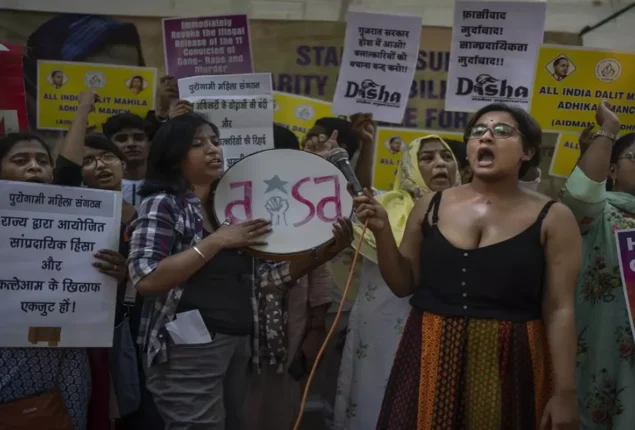Woman raped for three days describes the horrifying moment she realised she was abducted and the terrifying threat made by the suspect
According to court documents, a suspected kidnapper and rapist delivered a 23-year-old...

Protests against the release of 11 convicted rapists in India
On Saturday, hundreds of Indians demonstrated against a recent government decision to release 11 men who had been sentenced to life in prison for gang raping a Muslim woman during the country’s deadly religious riots in 2002. The demonstrators in the nation’s capital, New Delhi, shouted slogans and urged the Gujarat government to reverse its decision. Additionally, they sung songs in support of the victim.
Numerous other states also saw similar protests.
The 11 men were found guilty of rape, murder, and unlawful assembly in 2008 and were given suspended sentences when India celebrated its 75th anniversary of independence on August 15.
The victim, who is now in her 40s, recently claimed that the state of Gujarat’s judgment has rendered her numb and caused her confidence in justice to be shattered.
Typically, sexual assault victims are not identified by The Associated Press.
The victim was viciously gang raped while pregnant in Gujarat in 2002, during some of the worst religious riots India has seen since gaining independence from Britain in 1947. Over 1,000 people, predominantly Muslims, were slain during this time. The violence also resulted in the deaths of seven members of the woman’s family, including her three-year-old daughter.
Kavita Krishnan, a well-known activist, remarked that “the entire country should demand an answer directly from the prime minister of this country.” The inmates’ request for remission was approved, according to officials in Gujarat, where Prime Minister Narendra Modi’s Bharatiya Janata Party is in power, because they had served more than 14 years in prison. According to officials, the men qualified for remission under a 1992 regulation that was in place at the time of their sentencing. Remission release for persons convicted of certain crimes, including rape and murder, is prohibited under a newer version of the policy that the federal government enacted in 2014.
Modi, who was Gujarat’s highest elected official at the time, has long been plagued by the riots amid claims that the government permitted and even encouraged the killing. The Supreme Court stated there was insufficient evidence to bring charges against Modi despite his repeated denials of any involvement. A young protester in New Delhi named Asiya Qureshi claimed she took part in the demonstrations to demand justice for the victim.
“They released the rapists the same day Modi gave a speech on the safety and protection of women in India,” Qureshi claimed. “How do I stay safe in such a setting?”
Catch all the World News, Breaking News Event and Latest News Updates on The BOL News
Download The BOL News App to get the Daily News Update & Follow us on Google News.